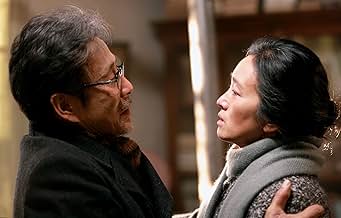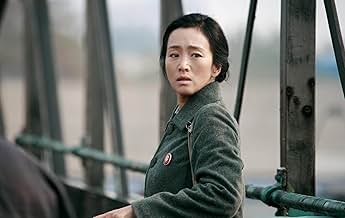IMDb RATING
7.2/10
7K
YOUR RATING
Lu and Feng are a devoted couple forced to separate when Lu is arrested and sent to a labor camp as a political prisoner during the Cultural Revolution. He finally returns home only to find ... Read allLu and Feng are a devoted couple forced to separate when Lu is arrested and sent to a labor camp as a political prisoner during the Cultural Revolution. He finally returns home only to find that his beloved wife no longer recognizes him.Lu and Feng are a devoted couple forced to separate when Lu is arrested and sent to a labor camp as a political prisoner during the Cultural Revolution. He finally returns home only to find that his beloved wife no longer recognizes him.
- Awards
- 23 wins & 49 nominations total
- Director
- Writers
- All cast & crew
- Production, box office & more at IMDbPro
Featured reviews
Sometimes a movie comes along that requires your patience, but is worth every minute of your time. "Coming Home" (PG-13, 1:49) is one of those movies. It's a Chinese film, which, for most of us, means subtitles, but this film is from Yimou Zhang, the director of "Hero" and "House of the Flying Daggers", and stars Gong Li (also known as Li Gong), who starred in "House of the Flying Daggers" and "Memoirs of a Geisha", as well as "Hannibal Rising" and "Miami Vice". This film's pace is slow, but an open-minded audience member's reward will be a dramatic and heart-breaking romance that you won't soon forget.
The setting is China, during Communist Party Chairman Mao Zedong's "Cultural Revolution". Starting in 1966, and only really ending with Mao's death in 1976, this was a nationwide effort to purge remnants of capitalism and even Chinese culture which ran contrary to Chairman Mao's personal interpretation of communism. Party officials and local police publicly humiliated and harassed people, seized property, relocated many Chinese citizens, tortured some and arbitrarily imprisoned others. One of those was a college professor named Lu Yanshi (Daoming Chen), whose time in Chinese labor camps kept him away from his wife, Feng Wanyu (Gong Li) and young daughter Dandan (Huiwen Zhang) for a total of 20 years.
As the film opens, Feng and her teenage daughter are summoned to the office of a party official who informs them that Lu has escaped from prison. The official sternly reminds them that failure to report any contact with Lu is a crime. The thoroughly indoctrinated Dandan responds obediently by spouting a line of communist propaganda. Feng merely responds that she understands. Lu does try to rejoin his family, resulting in some of the most tense and best-acted scenes I've ever watched on the big screen.
It is only after the Cultural Revolution ends that Lu can return home safely. By that time, Feng is suffering from a type of amnesia that requires her to refer to notes so she can accomplish ordinary daily tasks and, tragically, also renders her unable to recognize her husband. She remembers Feng as a young man, but when she finally sees him face to face, she mistakes him for a party official whom she hates and she kicks him out of the house. No one, can convince her that the man she has turned away really is Lu – not the local communist party officials and not even Feng's own daughter who has grown up to regret the ways she had denied or been disloyal to her father. Neither the audience, nor Lu himself knows whether, the next time Feng sees him, she'll mistake him for an old enemy, think that he is a piano tuner or a friendly neighbor, or even acknowledge him at all.
Lu takes up residence in an abandoned store across the street and his daughter, now living on her own, establishes a relationship with Lu and works with him to try overcoming her mother's amnesia. Feng receives a long-delayed letter from Lu telling her that he's coming home "on the 5th of the month". She readies the house in anticipation, even as she sees Lu around the neighborhood on a regular basis, but never recognizes him. Lu and Dandan talk to Feng's doctor and try various strategies, direct and indirect, hoping to get Feng to remember her heart-broken husband. Meanwhile, on the 5th of every month, Feng journeys to the train station and holds a hand-made sign with her husband's name on it until the last of the passengers have descended the long, stone staircase and the workers close the large, metal gates.
"Coming Home" is a combination of the 1965 classic romance "Doctor Zhivago" and the more modern romance in 2004's "The Notebook", but with a distinct Chinese sensibility. The setting, however, is merely background. This film has the potential to deeply affect people regardless of age or nationality. The acting is truly outstanding, especially from Gong Li who lives completely in every moment of this film, acts with every cell of her body and gives a performance for the ages. This film is so well written, directed, acted and edited that it requires no understanding of the Chinese language and no knowledge of Chinese history or culture to enjoy and appreciate this timeless tale of love, loss and redemption. It may sound trite, but the language of love truly is universal. That, and the other emotions and relationships that are part of this story require nothing more than a human heart to understand. I'd rather that this film had incorporated a little more variation in tone and pacing, but there is no denying this film's power to use the emotions of its characters to touch the emotions of its audience. "A-"
The setting is China, during Communist Party Chairman Mao Zedong's "Cultural Revolution". Starting in 1966, and only really ending with Mao's death in 1976, this was a nationwide effort to purge remnants of capitalism and even Chinese culture which ran contrary to Chairman Mao's personal interpretation of communism. Party officials and local police publicly humiliated and harassed people, seized property, relocated many Chinese citizens, tortured some and arbitrarily imprisoned others. One of those was a college professor named Lu Yanshi (Daoming Chen), whose time in Chinese labor camps kept him away from his wife, Feng Wanyu (Gong Li) and young daughter Dandan (Huiwen Zhang) for a total of 20 years.
As the film opens, Feng and her teenage daughter are summoned to the office of a party official who informs them that Lu has escaped from prison. The official sternly reminds them that failure to report any contact with Lu is a crime. The thoroughly indoctrinated Dandan responds obediently by spouting a line of communist propaganda. Feng merely responds that she understands. Lu does try to rejoin his family, resulting in some of the most tense and best-acted scenes I've ever watched on the big screen.
It is only after the Cultural Revolution ends that Lu can return home safely. By that time, Feng is suffering from a type of amnesia that requires her to refer to notes so she can accomplish ordinary daily tasks and, tragically, also renders her unable to recognize her husband. She remembers Feng as a young man, but when she finally sees him face to face, she mistakes him for a party official whom she hates and she kicks him out of the house. No one, can convince her that the man she has turned away really is Lu – not the local communist party officials and not even Feng's own daughter who has grown up to regret the ways she had denied or been disloyal to her father. Neither the audience, nor Lu himself knows whether, the next time Feng sees him, she'll mistake him for an old enemy, think that he is a piano tuner or a friendly neighbor, or even acknowledge him at all.
Lu takes up residence in an abandoned store across the street and his daughter, now living on her own, establishes a relationship with Lu and works with him to try overcoming her mother's amnesia. Feng receives a long-delayed letter from Lu telling her that he's coming home "on the 5th of the month". She readies the house in anticipation, even as she sees Lu around the neighborhood on a regular basis, but never recognizes him. Lu and Dandan talk to Feng's doctor and try various strategies, direct and indirect, hoping to get Feng to remember her heart-broken husband. Meanwhile, on the 5th of every month, Feng journeys to the train station and holds a hand-made sign with her husband's name on it until the last of the passengers have descended the long, stone staircase and the workers close the large, metal gates.
"Coming Home" is a combination of the 1965 classic romance "Doctor Zhivago" and the more modern romance in 2004's "The Notebook", but with a distinct Chinese sensibility. The setting, however, is merely background. This film has the potential to deeply affect people regardless of age or nationality. The acting is truly outstanding, especially from Gong Li who lives completely in every moment of this film, acts with every cell of her body and gives a performance for the ages. This film is so well written, directed, acted and edited that it requires no understanding of the Chinese language and no knowledge of Chinese history or culture to enjoy and appreciate this timeless tale of love, loss and redemption. It may sound trite, but the language of love truly is universal. That, and the other emotions and relationships that are part of this story require nothing more than a human heart to understand. I'd rather that this film had incorporated a little more variation in tone and pacing, but there is no denying this film's power to use the emotions of its characters to touch the emotions of its audience. "A-"
I had high expectation for Zhang Yimou's latest film Coming Home, because he finally went back to tell a simple and plain story. So when I heard there was an advanced screening on May 11, I immediately went to see it. However, after watching this 111-minute movie, I was disappointed. To be precisely, I had mixed feeling about the film, I think it is Zhang's best film since House of Flying Daggers, however it is still not a good film. The story is simple, the cinematography is simple, everything is simple in this film, just like what Zhang promised. He intended to make everything simple, trying so hard to drop his color- using style and maintain simple. However, such simpleness is intended, it is not natural. For simple life story movies (Yi Yi, Platform, The World, A Simple Life), the key to be a great movie is if it could give audience a special feeling and a deep theme through its simpleness. And such thing behind its simpleness is the soul of the movie. However, Coming Home didn't achieve that, I can barely feel anything behind its intended simpleness and schmaltz. Its soul is empty. Still, I have to admit, there are some good sides of the film, especially Gong Li and Chen Daoming's amazing acting. Their performances are superb, one of the best performances I've seen in recent years. Also, I love the well-crafted first 10-minute and the sentimental ending. All in all, I appreciated Zhang's trying of going back to the simple and I wish he could continue that. Coming Home may not be a fantastic film but it is still a well-crafted movie with some touching moments. My score: 7.1
(PS: To understand the film ,be sure to learn some background information and the history about the Cultural Revolution. Due to the censorship in China, Zhang can't tell something about the story too obvious, so if you know nothing about that history, you will be confused by something happens in the film.)
(PS: To understand the film ,be sure to learn some background information and the history about the Cultural Revolution. Due to the censorship in China, Zhang can't tell something about the story too obvious, so if you know nothing about that history, you will be confused by something happens in the film.)
In China, in the early 70s, Lu Yanshi (Daoming Chen), a political prisoner, is released at the end of the Cultural Revolution. When he returns home, he discovers that his wife Feng Wanyu (Gong Li) is suffering from amnesia: she waits every day for the return of her husband, without understanding that he is at her side.
I loved the infinite tenderness that emerges from this film. The rhythm of the film is intentionally slow and we feel a real chemistry between the three main actors (father, mother and daughter). The director Yimou Zhang immerses us in a beautiful love story with the poignant beauty and intense presence of the actress Gong Li, with the extraordinary talent of the actor Daoming Chen who plays soberly in the shadow of his wife, with a neat, delicate and graceful photography.
As a synthesis: behind a slight facade of political pamphlet, a delightful ode of lyricism. 8/9 of 10
I loved the infinite tenderness that emerges from this film. The rhythm of the film is intentionally slow and we feel a real chemistry between the three main actors (father, mother and daughter). The director Yimou Zhang immerses us in a beautiful love story with the poignant beauty and intense presence of the actress Gong Li, with the extraordinary talent of the actor Daoming Chen who plays soberly in the shadow of his wife, with a neat, delicate and graceful photography.
As a synthesis: behind a slight facade of political pamphlet, a delightful ode of lyricism. 8/9 of 10
By 'simple pleasures', I don't mean that in any way to reference the Chinese Cultural Revolution, but his return to simple films, about simple people, beautifully crafted, acted, and very revealing about everyday Chinese life (as much as he is able).
Zhang Yimou (Chinese names put the surname first, IMDb doesn't, alas) is arguably one of the best directors of the 20th and early 21st centuries (best known in the West for House of Flying Daggers). He always evokes a magical feeling in me, and I love his technique and precision; almost every frame is a painting. He chose to remain in mainland China and has walked a very thin tightrope in making the kinds of films he has, as he does not shy away from the political situation in China, at least as part of everyday people's lives, which it is, of course. His films are just not primarily about Chinese politics (although his simple, but great early film, The Story of Qiu Ju, is about Chinese bureaucracy, and was indeed banned for a time. The fact that Gong Li, in this film, screams to the prison officials that have come to capture her husband, "What did you do to him to make him want to escape?", turning the blame for his prison escape back onto them, illustrates what their intl fame allows them to get away with.
Gong Li, Zhang Yimou's ex-wife, is, I believe, the premiere female actress in China (and now known worldwide, since the wonderful film, Raise the Red Lantern, was nominated for an Oscar in 1990), with good reason, and an actress of incredible breadth and depth. Even though she has been on many 'most beautiful people' lists, (she is very made up here (or down!)), her craft is everything and I cannot watch her enough. She is lately known here for Memoirs of a Geisha, as the evil Hatsumomo.
I was very, very glad to see Zhang Yimou and Gong Li reunite, professionally, for 2 recent films. They seem to push each other upward and she makes a perfect muse for him.
Ah, the film...(I love telling people about them!). Coming Home is about a couple dealing with and trying to reunite after Gong Li's husband is imprisoned for a couple of decades during the Cultural Revolution in China. She grows progressively ill, which adds to their difficulties, thus the meat of the movie is about their reuniting difficulties. Definitely without a stock Hollywood ending! I was struck by one very incredible scene... It is just a walk across the kitchen by Gong Li, when her husband is knocking at her door. She has been warned severely by the police. This walk seems to take several hours as she haltingly walks across the floor, with all the ramifications, both political and personal, flashing across her face and obviously in her mind. It is one of the most astonishing 20 seconds of film I think I have ever seen, and done without dialog, melodrama or Hollywood artifice.
Zhang Yimou has crafted a fine film here. It is slow, but in a good way, which builds a lot of emotional suspense. Someone said it only covers the last 20-30 pages of the book upon which it is based. As usual, every aspect of the film is top notch and it walks on the edge of the dramatic sword in a perfectly balanced manner. It will go down as another of my favorite Zhang Yimou movies. Be patient, although the tension he creates will keep you pinned, if not a bit frustrated, but that is also the beauty of it, and enjoy! And check out some of his other films!
Zhang Yimou (Chinese names put the surname first, IMDb doesn't, alas) is arguably one of the best directors of the 20th and early 21st centuries (best known in the West for House of Flying Daggers). He always evokes a magical feeling in me, and I love his technique and precision; almost every frame is a painting. He chose to remain in mainland China and has walked a very thin tightrope in making the kinds of films he has, as he does not shy away from the political situation in China, at least as part of everyday people's lives, which it is, of course. His films are just not primarily about Chinese politics (although his simple, but great early film, The Story of Qiu Ju, is about Chinese bureaucracy, and was indeed banned for a time. The fact that Gong Li, in this film, screams to the prison officials that have come to capture her husband, "What did you do to him to make him want to escape?", turning the blame for his prison escape back onto them, illustrates what their intl fame allows them to get away with.
Gong Li, Zhang Yimou's ex-wife, is, I believe, the premiere female actress in China (and now known worldwide, since the wonderful film, Raise the Red Lantern, was nominated for an Oscar in 1990), with good reason, and an actress of incredible breadth and depth. Even though she has been on many 'most beautiful people' lists, (she is very made up here (or down!)), her craft is everything and I cannot watch her enough. She is lately known here for Memoirs of a Geisha, as the evil Hatsumomo.
I was very, very glad to see Zhang Yimou and Gong Li reunite, professionally, for 2 recent films. They seem to push each other upward and she makes a perfect muse for him.
Ah, the film...(I love telling people about them!). Coming Home is about a couple dealing with and trying to reunite after Gong Li's husband is imprisoned for a couple of decades during the Cultural Revolution in China. She grows progressively ill, which adds to their difficulties, thus the meat of the movie is about their reuniting difficulties. Definitely without a stock Hollywood ending! I was struck by one very incredible scene... It is just a walk across the kitchen by Gong Li, when her husband is knocking at her door. She has been warned severely by the police. This walk seems to take several hours as she haltingly walks across the floor, with all the ramifications, both political and personal, flashing across her face and obviously in her mind. It is one of the most astonishing 20 seconds of film I think I have ever seen, and done without dialog, melodrama or Hollywood artifice.
Zhang Yimou has crafted a fine film here. It is slow, but in a good way, which builds a lot of emotional suspense. Someone said it only covers the last 20-30 pages of the book upon which it is based. As usual, every aspect of the film is top notch and it walks on the edge of the dramatic sword in a perfectly balanced manner. It will go down as another of my favorite Zhang Yimou movies. Be patient, although the tension he creates will keep you pinned, if not a bit frustrated, but that is also the beauty of it, and enjoy! And check out some of his other films!
Spielberg "cried for an hour" did not lie. I felt like I had been stabbed and watched, and I felt like I was dehydrated when I left the cinema. The Chinese love, which is not fast-paced, is surrounded by the times and shows two sides.
Did you know
- TriviaComing Home (2014) had its international premiere at the 2014 Cannes Film Festival in the out of competition section. It was scheduled to be screened in the Special Presentations section of the 2014 Toronto International Film Festival.
- ConnectionsFeatured in Sven Uslings Bio: Bästa filmer 2020 Del 1: Plats 20-11 (2021)
- SoundtracksSong of the Fishermen
Written by Ren Guang
Arranged by Quigang Chen
- How long is Coming Home?Powered by Alexa
Details
- Release date
- Country of origin
- Official site
- Language
- Also known as
- The Criminal Lu Yanshi
- Filming locations
- Production companies
- See more company credits at IMDbPro
Box office
- Gross US & Canada
- $377,607
- Opening weekend US & Canada
- $26,361
- Sep 13, 2015
- Gross worldwide
- $47,587,984
- Runtime
- 1h 49m(109 min)
- Color
- Sound mix
- Aspect ratio
- 2.35 : 1
Contribute to this page
Suggest an edit or add missing content



































